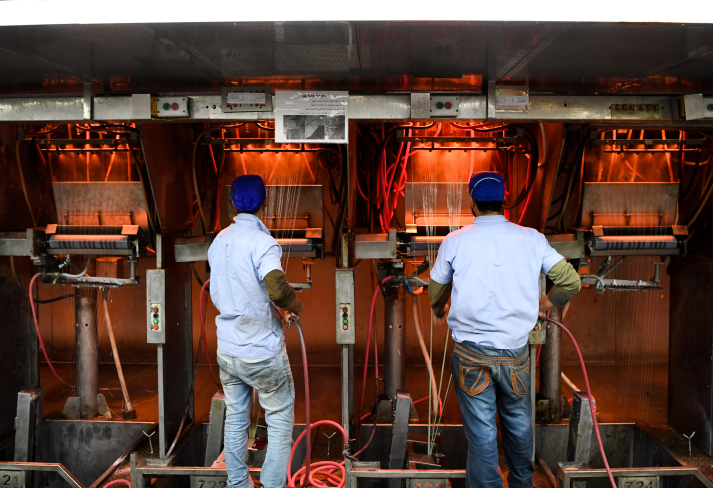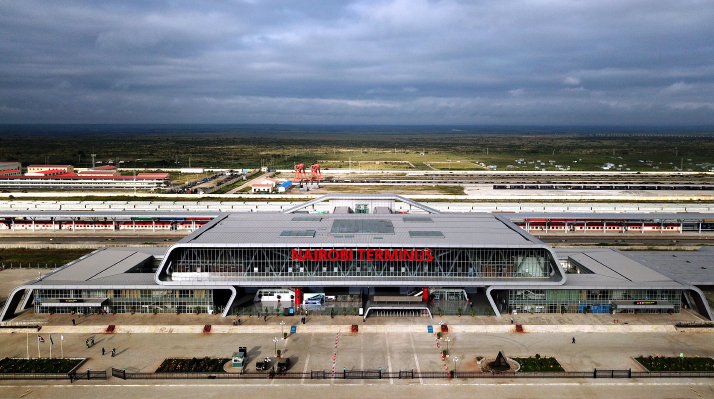|
||||||||||
| Home Nation World Business Opinion Lifestyle ChinAfrica Multimedia Columnists Documents Special Reports |
|
||||||||||
| Home Nation World Business Opinion Lifestyle ChinAfrica Multimedia Columnists Documents Special Reports |
| ChinAfrica |
| Sowing Seeds of Development |
| The construction of infrastructure and industrial parks under the Belt and Road Initiative is contributing to Africa's economic development |
| By Ge Lijun | VOL.11 June ·2019-06-19 |

Egyptian employees work in a workshop of Jushi Egypt For Fiberglass Industry S.A.E. in the China-Egypt TEDA Suez Economic and Trade Cooperation Zone (WU HUIWO)
The over 750-km Addis Ababa-Djibouti Railway has become a development symbol in East Africa. Built by two Chinese companies, it allows goods to be transported between the capitals of Ethiopia and Djibouti in only 12 hours, compared to seven days by road. Costs have also been slashed by 30 percent.
The project is the result of an industrial chain that combines leading standards in design, financing and investment, materials, construction and management as part of the Belt and Road Initiative (BRI).
"During the process of cooperation with African countries, China shares valuable development experience, taking into account the realities of local development," said Zhang Jianping, Director of the West Asia and Africa Research Institute under the Beijing-based Chinese Academy of International Trade and Economic Cooperation.
Based on its experience, China has made considerable efforts to improve and accelerate the construction of infrastructure, industrial parks and communication networks in Africa, in order to foster the continent's development.
Vital arteries
The Mombasa-Nairobi Standard Gauge Railway is an emblematic project of this cooperation. Travel time between the two Kenyan cities has been cut from 10 hours to just five. In March 2019, 2.6 million passengers used the line, with an average daily occupancy rate of over 97 percent.
According to a report from the National Transport and Safety Authority of Kenya, the reduction in logistics costs, between 10 percent and 40 percent, has resulted in a 40.1-percent increase in the volume of goods in transit. The railway has not only created more business opportunities for Kenya, but also strengthened the nation's economic ties with other landlocked countries in East Africa. Kenya now has the assets to become a regional logistics and manufacturing center.
"Africa has great potential for infrastructure," said Nkolo Foe, a professor at the University of Yaounde in Cameroon. Indeed, the continent - which represents 23 percent of the earth's surface - accounts for only 7 percent of the total length of the rail lines in the world. As for the density of the roads and highways, they represent respectively a quarter and a 10th of the world average. In addition, nearly half of African countries suffer from electricity
shortages and 40 percent of the continent's population do not have access to drinking water.
According to the African Development Bank's 2019 African Economic Outlook report, the annual need for infrastructure financing in Africa is between $130 billion and $170 billion. At present, the continent can satisfy only about a third.
"The new Silk Roads are a good opportunity to build these infrastructures, promote regional connectivity, trade and growth," Abebe Selassie, Director of the African Department of the International Monetary Fund, said, referring to the overland Silk Road Economic Belt and the 21st-Century Maritime Silk Road, the two prongs of the BRI. "More importantly, communication and cooperation in the private sector is also taking place. Indeed, Sub-Saharan Africa needs to increase investment and productivity in all sectors in regional structural transformation efforts."
Selassie said China has played an important role in this process, through foreign direct investment (FDI) and technology transfer. World Bank research shows that the BRI-built transport network has boosted FDI in countries and regions along the Belt and Road routes by 4.97 percent. This is expected to contribute 0.13 percent to Sub-Saharan African countries' annual GDP growth.

Nairobi Terminus of the Mombasa-Nairobi Standard Gauge Railway constructed under the Belt and Road Initiative (XINHUA)
Industrial cooperation
Industrial cooperation is also a priority of the BRI in Africa. Chinese investments have enabled African countries to strengthen their industrial capacities and create jobs.
According to Qian Keming, Chinese Vice Minister of Commerce, through economic and trade cooperation zones, Chinese companies have brought industrial park construction models, technologies and talents.
The China-Egypt TEDA Suez Economic and Trade Cooperation Zone with its win-win spinoffs is a leading example. Located more than 120 km from Cairo, the Egyptian capital, the zone lies on the banks of the Suez Canal. Its initial area of 1.34 square km attracted nearly 80 companies and more than $1 billion in investments. By creating 3,500 direct jobs, these companies have helped 30,000 people in their livelihoods.
Now in the 6-square-km extension zone, efforts are on to form new automotive and textile industry clusters. The current infrastructure has attracted eight businesses and $200 million in investments.
According to a report of the Advisory Committee of the Belt and Road Forum on International Cooperation published in April, industrial cooperation is an important element of the BRI that can lead to concrete results, such as industrialization and economic growth, the catalytic effects of infrastructure interconnection. In recent years, a large number of industrial parks have been built, strengthening industrial cooperation and promoting the industrialization of Africa.
To date, China has signed an intergovernmental memorandum of understanding on BRI with 37 African countries, as well as with the African Union. The memorandum will promote cooperation in infrastructure, industrial capacity-building and trade facilitation.
(Comments to glj@chinafrica.cn)
|
||||||||||||
| About Us | Contact Us | Advertise with Us | Subscribe |
| Copyright Beijing Review All rights reserved 京ICP备08005356号-5 京公网安备110102005860号 |